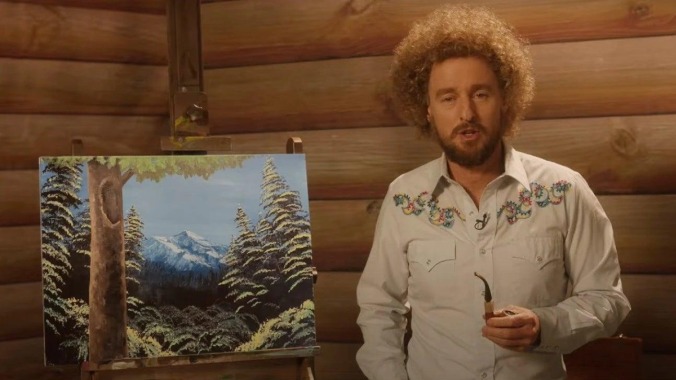Paint Review: Owen Wilson colors outside the lines
Dry, sorrowful comedy offers a clever take on modern maleness and a certain PBS favorite

In the mostly delightful farce Paint, Owen Wilson proves he knows the difference between a comic actor and a comedian who acts. The frequently riotous script by writer-director Brit McAdams feels like it was written with Will Ferrell in mind, circa Anchorman. There’s a savagely satirized and archetypal central character, loosely based on public TV painting instructor Bob Ross; a workplace power struggle nominally embedded in what used to be called the Battle of the Sexes; and ceaseless mockery aimed at the badly aged hairstyles and vehicle habits of the Scooby-Doo era. As a former sketch comic, Ferrell mainly inhabited broad, high-concept characters like NASCAR legend Ricky Bobby, anchorman Ron Burgundy, and Buddy the Elf, all of whom would not have seemed out of place in a ’90s episode of Saturday Night Live.
Paint’s Carl Nargle is a character like that too: the most popular local PBS TV personality in all of Burlington, Vermont—which doesn’t sound like much of an achievement until it starts to slip away from you, as it does from Carl. Sporting a white boy ’fro and driving a Chevy van that could pass for the Scooby-Doo Mystery Machine, Carl is a sexist dinosaur who has bedded the entire female staff of his local PBS affiliate, breaking hearts and compromising productivity in a single swoop. He’s a narcissist too, though he pretends to be the caring, John Denver folkie type. In the early oughts, Ferrell would have had a field day with him.
Wilson does too, but it’s a field day of a different type. Carl’s heart is broken, and that’s not a comedy trope in Paint—Wilson makes you feel it, and it’s the buried sorrow that makes Carl run. The love of his life, Katherine (Michaela Watkins, channeling Catherine Keener), cheated on Carl when the local celebrity turned his head, and now she runs the station in all but name. So Carl gets to witness Katherine’s romantic dalliance with Ambrosia (Ciara Renee), the edgy and multicultural street artist hired to replace him.
Wilson, whose dad ran a public television station in Dallas, saw something great in McAdams’ script, and reportedly tried to get it made for years. Wilson isn’t making fun of Carl’s feelings, he’s playing them with every subatomic particle of his hangdog soul. While this doesn’t make Carl less absurd, it does ground him long enough to illuminate the acute sense of male dislocation Carl’s absurdity flows from.
 Keep scrolling for more great stories.
Keep scrolling for more great stories.
